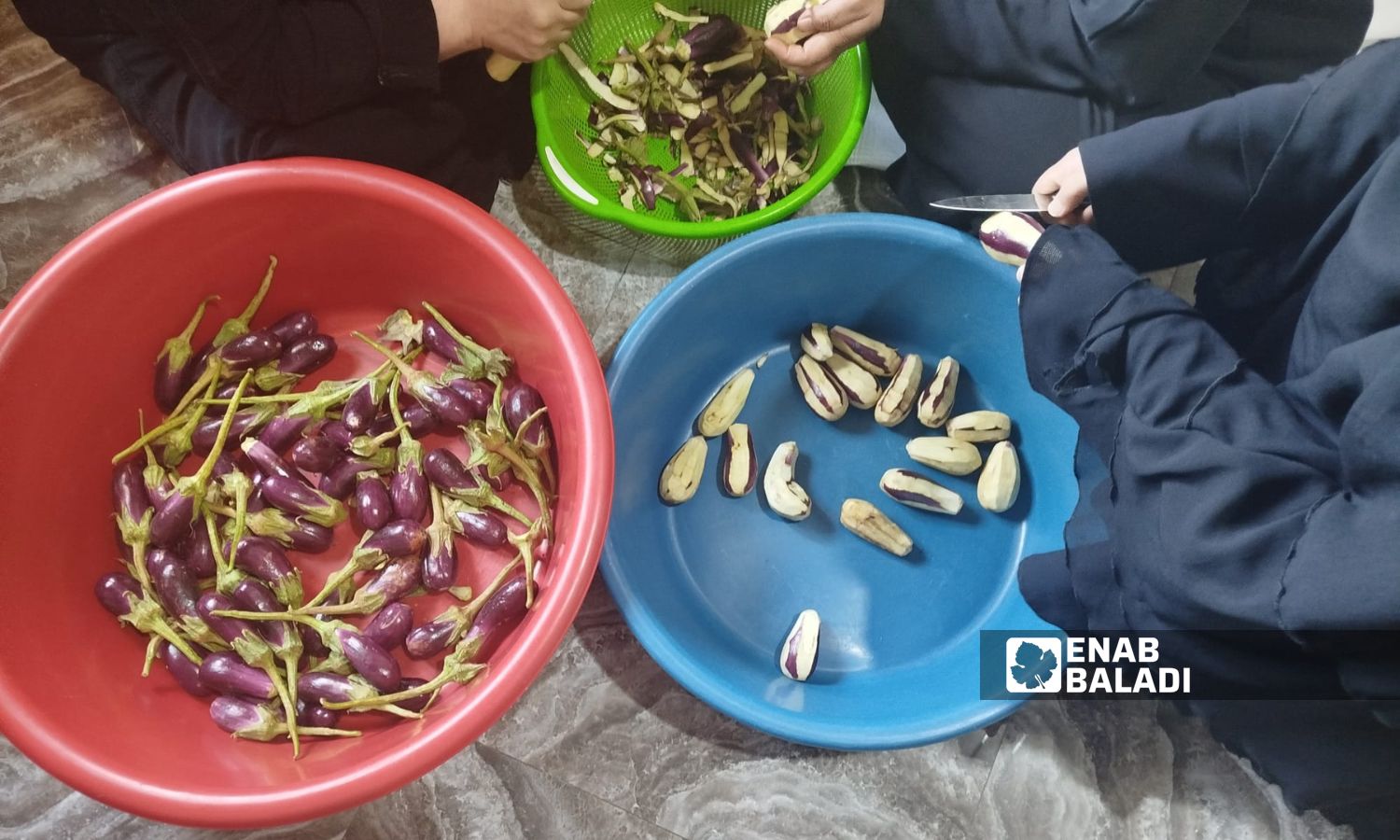



From her rented house in the city of al-Dana, northern Idlib, Fadila Muhammad al-Halou (33 years old) decided to launch her own project by preparing food and pantry items to provide an additional source of income for her family, which was displaced from the northern countryside of Aleppo in 2016.
Three months ago, the beginning was rocky, with tools that somewhat failed to meet her needs in a project she considered a “dream,” driven by the poor living conditions that accompanied a wave of inflation in rents, electricity, food, and more.
Al-Halou named her project “Kitchen of Passion,” in an attempt to help her family. She is a mother of four children (three of whom have disabilities) and cannot leave them to work outside the home.
Al-Halou told Enab Baladi that she is passionate about cooking and enjoys preparing meals, and this is where the idea for the name of her kitchen (Passion) came from. She began promoting her Eastern dishes and some pantry items like “Makdous” and pomegranate molasses on social media platforms.
She created several accounts for herself and found popularity among fans of home-cooked food, despite the difficulties she faced, including financial constraints and the lack of sufficient kitchenware, dishes, and other essential equipment, according to her.
Regarding the prices of her dishes, she mentioned that the price of “Mandi Mansaf,” which consists of one and a half kilograms of chicken thighs, along with one kilogram of rice before cooking, nuts, and two plates of sauce (Daqous), costs 350 Turkish lira (11 USD).
The price of fried kibbeh (one kilogram of lamb meat with one kilogram of bulgur with grilled shish) is 800 Turkish lira, while the price of a “Yalanji” meal, which is the most requested, is 100 Turkish lira.
These meals are a choice for occasions and individuals and are considered reasonably priced compared to restaurants and the quality and quantity of materials used, with prices varying according to the seasons of vegetable and meat availability, as these are not fixed prices, according to her.
The lady mentioned that working “with love” while maintaining quality and cleanliness and arranging the plates increased the demand for her orders, and she gained a good reputation for her preparation, leading to an opportunity for her to become a certified trainer for an international organization in the field of food businesses.
She added that she has conducted a series of training sessions for women on how to prepare most Eastern dishes and pantry items, opening a door for them to secure a stable source of income after learning the essential points for successful work, such as organization, securing raw materials, receiving orders at least a day in advance, promoting their products in an eye-catching way, and setting prices that align with the economic reality, with a small profit margin to attract the largest number of customers.
Al-Halou’s project is not the only one that started from the kitchen to achieve financial returns; in recent years, similar projects have emerged for women who have ventured into home-based work, whether in cooking, confectionery, candle-making, embroidery, sewing, and more.
The surge of such projects is due to the scarcity of job opportunities, the low purchasing power, and the insufficiency of the husband’s or family provider’s income. The daily wage for laborers ranges between 70 and 100 Turkish lira, which is not enough to cover the basic needs of the family.
The recognized poverty line in northwestern Syria is 10,791 Turkish lira, and the extreme poverty line is 9,033 Turkish lira, according to the Syria Response Coordination Group (SRCG) operating in the region.
Women who wish to work face several obstacles, the most prominent of which are the lack of education and experience, limited job opportunities, as well as the difficulty of balancing family care and work; there is also a lack of transportation to workplaces and the absence of academic certification, according to a study by the Syria Civil Defence (The White Helmets).
Despite the existence of training institutes that equip women with some skills and experience, women often engage in strenuous and risky jobs to secure their diverse needs, especially amid rising prices and low wages.
Some women, especially those living in displaced persons’ camps across the north, resort to jobs typically identified as men’s roles or engaging in hazardous activities, such as searching through piles of waste for plastic, amidst the spread of unexploded ordnance from the war.
if you think the article contain wrong information or you have additional details Send Correction